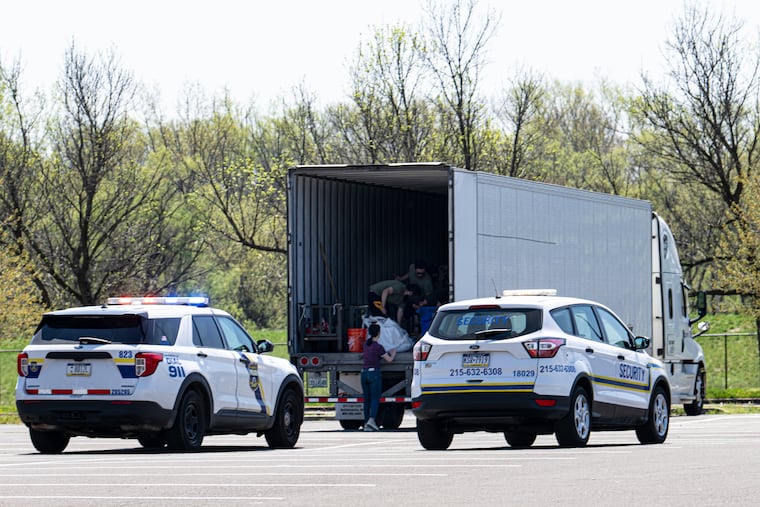Philly men charged with stealing more than $200,000 ... in dimes
The $234,500 heist was the culmination of a spree of tractor-trailer robberies in which the crew stole frozen crab legs, shrimp, beer and liquor from trucks moving through the city, prosecutors say.

Federal authorities unsealed charges against four men Friday in connection with the brazen theft of more than two million dimes from a truck hauling them from the U.S. Mint earlier this year.
The $234,500 heist — with a haul weighing more than a ton — was the culmination of a spree of tractor-trailer robberies in which the same crew stole frozen crab legs, shrimp, meat, beer and liquor from trucks passing through the region, prosecutors said in court filings.
Now, all four men charged — Rakiem Savage, 25; Ronald Byrd, 31; Haneef Palmer, 30; and Malik Palmer, 32, all of Philadelphia — are facing charges including conspiracy, robbery and theft of government money that could send them to prison for decades.
Lawyers for the men did not immediately return calls for comment Saturday. All four are in FBI custody and scheduled to appear for detention hearings before a U.S. magistrate judge Monday.
Investigators believe that the April 13 coin caper — which left thousands of dimes scattered across the roadway, shimmering in the sun as the thieves made their escape — came after weeks of Savage, Byrd and the Palmers committing similar crimes.
In each case, their methods appeared the same. The men would strike tractor-trailers carrying goods through Philadelphia, often as they were parked in area parking lots overnight so the drivers could rest during their cross-country journeys.
They allegedly hauled the drivers out of their trucks — sometimes by force — before opening the back of the trailers with bolt cutters.
The men often came equipped with a white box truck to transport the cargo they stole and then would later sell the goods over the internet, according to the seven-count indictment filed against them.
In March, prosecutors say, Savage stole 60 cases of Jose Cuervo off a truck. Two weeks before the dime robbery, he and the Palmers stole six refrigerators off another trailer, pulling the driver from the vehicle and forcing him to lie under their white box truck while they made off with his cargo.
Eight days later, prosecutors said, Byrd attempted to sell off the booty from one heist, sending messages to a number of people announcing that he had stolen frozen shrimp to sell.
But police believe that when the crew stumbled across an unmarked tractor-trailer parked in the Walmart parking lot at Philadelphia Mills mall, they had no idea of the cargo they’d find inside: More than 7.5 million dimes — worth roughly $750,000, weighing about six tons and loaded onto several pallets.
Investigators say the driver, who had picked up the coins that morning from the U.S. Mint in Philadelphia, was taking them to Miami and had pulled over in the parking lot for the night to sleep.
Surveillance video shows six men, dressed in gray hoodies and armed with bolt cutters, approaching the truck in the middle of the night and breaking the lock that protected the goods inside.
Once the thieves discovered that the pallets of coins would be too heavy to carry, they split them open, began loading them into smaller bags and loading them into a waiting truck, Philadelphia Police Capt. John Ryan, commanding officer of the Northeast Detectives, said at the time.
Hundreds of thousands of dimes were spilled across the parking lot in the process. And as the thieves made their escape, footage shows them pausing to steal recycling bins from nearby houses — presumably to help later unload their haul.
While the theft confounded authorities at the time, one question, in particular, lingered: How does one spend millions of stolen dimes — the smallest widely used coin in the U.S. — without drawing attention.
The indictment unsealed Friday offered some clues. The day after the theft, it says, Malik Palmer sent the others a link to an online calculator that can estimate the total cash value of a collection of coins based on weight and denomination.
In the weeks after the theft, the others allegedly converted thousands of dollars of dimes into cash at Coinstar machines in Maryland or by depositing them in at least four different banks in suburban Philadelphia.
Still, the amount of converted coins specifically detailed in the indictment — adding up to only a couple thousand dollars — is only a fraction of the more than $200,000 total authorities say the group stole.
As for what happened to the rest?
“If for some reason you have a lot of dimes at home,” Philadelphia police spokesperson Miguel Torres told the New York Times at the time, “this is probably not the time to cash them in.”